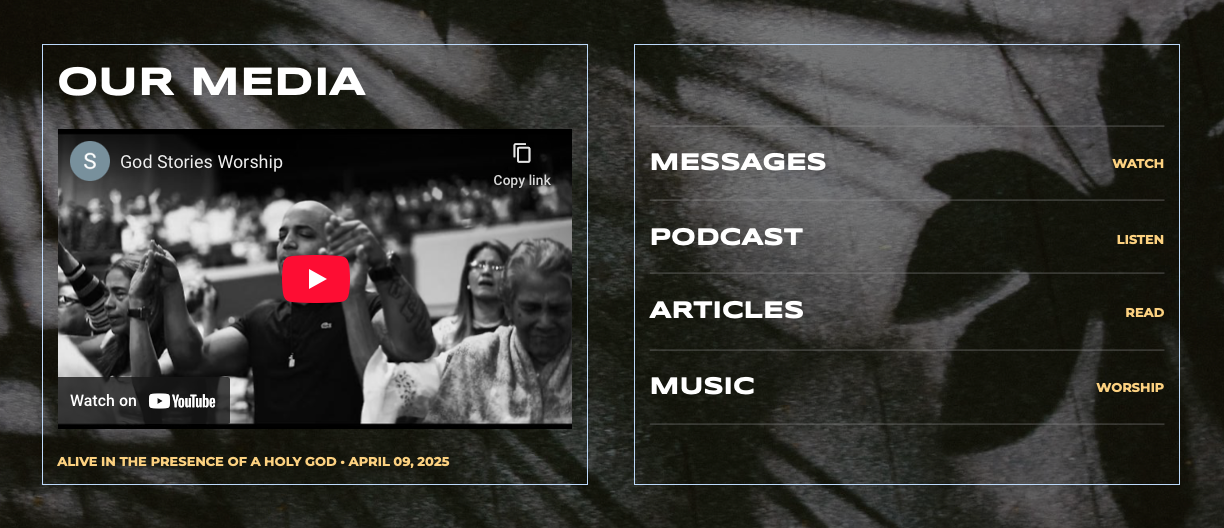7 Essential Features Every Church Website Needs in 2025
Transform Your Church Website From Digital Brochure to Ministry Growth Tool

Your church website is often the first impression people get of your ministry. In 2025, having just a basic site with service times and a contact form isn't enough. Modern churchgoers expect websites that are engaging, informative, and easy to navigate on any device.
After analyzing successful church websites and working directly with ministry leaders, I've identified the features that make the biggest difference in visitor engagement and member connection. Whether you're launching a new site or updating an existing one, these seven elements will help your church website serve your mission more effectively.
1. Mobile-First Design That Actually Works
Over 60% of church website visitors browse on mobile devices, yet many church sites still prioritize desktop layouts. Your website needs to look professional and function seamlessly on smartphones and tablets.
Key mobile considerations:
- Large, tappable buttons for service times and contact info
- Readable fonts without zooming
- Fast-loading images and minimal scrolling
- Easy access to live streaming and giving options
A mobile-optimized site doesn't just improve user experience—it also boosts your search engine rankings, helping more people discover your church online.
2. Clear Navigation and Service Information
Visitors should find essential information within seconds of landing on your homepage. This includes:
- Service times and locations (prominently displayed)
- What to expect as a first-time visitor
- Directions and parking details
- Contact information that's easy to find
Consider adding a "Plan Your Visit" or "New Here?" section that addresses common questions newcomers have. This reduces barriers and makes people feel welcome before they even walk through your doors.

3. Integrated Online Giving Platform
Modern church websites need seamless giving options that work across all devices. Your giving platform should:
- Accept multiple payment methods (cards, bank transfers, digital wallets)
- Allow recurring donations and pledge management
- Provide secure, PCI-compliant processing
- Generate automatic receipts for tax purposes
Integration with your church management system (like Planning Center or ChMS) ensures donation tracking stays organized and accessible for your finance team.
4. Live Streaming and Sermon Archive

Post-pandemic, online service access has become standard, not optional. Your website should feature:
- Live streaming integration that works reliably
- Searchable sermon archive organized by date, series, and topic
- Easy sharing options for social media
- Accessible playback with good audio quality
Whether someone missed Sunday service or wants to revisit a message, having content readily available extends your ministry reach beyond physical attendance.
5. Event Management and Registration
Churches host numerous events throughout the year—conferences, small groups, volunteer opportunities, and community outreach. Your website should make event promotion and registration simple:
- Visual event calendars with filtering options
- Online registration with payment processing
- Automated confirmation emails and reminders
- Integration with your CRM for follow-up communications
This eliminates manual administrative work and provides better data on event attendance and member engagement.
6. Ministry and Small Group Connection Tools
Help visitors find their place in your church community through:
- Ministry overviews with leader contact information
- Small group listings with meeting times and locations
- Volunteer opportunity database with easy sign-up
- Staff and leadership bios that put faces to names
Making connections personal and accessible helps newcomers move from visitors to active participants in church life.
7. Content Management That Your Team Can Actually Use
Your website needs regular updates—new events, sermon uploads, ministry announcements, and blog posts. Choose a platform that allows multiple team members to:
- Add and edit content without technical knowledge
- Schedule posts and updates in advance
- Maintain consistent branding and formatting
- Back up content automatically
When your communications team can easily manage website updates, your online presence stays fresh and relevant.

Making Your Church Website Work Harder
These seven features create websites that do more than inform—they connect, engage, and support your ministry goals. The best church websites become tools for discipleship, not just digital brochures.
At Streaming Nations Media, we specialize in building church websites that incorporate these essential features while reflecting your unique ministry personality. Our website packages include mobile optimization, giving integration, and content management training for your team.
Ready to upgrade your church's online presence? Book a free strategy call to discuss how these features can work for your specific ministry needs.
The most successful church websites incorporate these features to serve their communities more effectively. Whether you're a small rural congregation or a multi-campus ministry, the right website elements make a measurable difference in visitor engagement and member connection..




